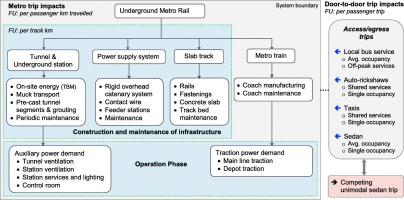当前位置:
X-MOL 学术
›
Environ. Impact Assess. Rev.
›
论文详情
Our official English website, www.x-mol.net, welcomes your feedback! (Note: you will need to create a separate account there.)
Environmental life cycle assessment of underground metro rail: A case study in Mumbai Metropolitan Region, India
Environmental Impact Assessment Review ( IF 6.122 ) Pub Date : 2024-04-10 , DOI: 10.1016/j.eiar.2024.107501 Amar Mohan Shinde , Anil Kumar Dikshit , Arti Soni
Environmental Impact Assessment Review ( IF 6.122 ) Pub Date : 2024-04-10 , DOI: 10.1016/j.eiar.2024.107501 Amar Mohan Shinde , Anil Kumar Dikshit , Arti Soni

|
The metro rail systems have been vigorously promoted to reduce the emissions from the urban transport sector in India. However, their construction and operation are associated with high energy consumption and corresponding emissions. This study evaluated the life cycle environmental impact of the first underground metro rail transit in the Mumbai Metropolitan Region, India. The system boundary comprises the construction and maintenance of the tunnel, underground stations, slab track, power supply system, and trains. The operation phase accounts for the traction power demand for running trains and auxiliary power demand for operating the station services. GaBi 6.5 has been used to normalize the results per track-km (TKM) of the transit system and per passenger-km travelled (PKT). It has been found that the construction of underground stations is the major contributor (70% of 17,300 t CO-eq/TKM, 52 t SO-eq/TKM) to the life cycle impact of the infrastructure, whereas the auxiliary power demand dominates the life cycle impact (63% of 25 g CO-eq/PKT) of the metro rail. Further results show that the door-to-door trip with a local bus service will have a 58% lower impact than a competing sedan trip. On the basis of these results, possible recommendations were proposed, such as deploying energy-efficient trains and metro stations, utilizing electricity that has met renewable goals, and endorsing high ridership. This study provides background data to quantify the environmental impacts of existing and forthcoming metro rail projects in India.
中文翻译:

地下地铁轨道的环境生命周期评估:以印度孟买都市区为例
印度大力推广地铁系统,以减少城市交通部门的排放。然而,它们的建设和运营伴随着高能耗和相应的排放。本研究评估了印度孟买大都市区第一条地下地铁轨道交通的生命周期环境影响。系统边界包括隧道、地下车站、板式轨道、供电系统和列车的建设和维护。运营阶段考虑运行列车的牵引电力需求和运营车站服务的辅助电力需求。 GaBi 6.5 已用于标准化交通系统每轨道公里 (TKM) 和每乘客行驶公里 (PKT) 的结果。研究发现,地下车站的建设是基础设施生命周期影响的主要贡献者(17,300 吨 CO-eq/TKM 的 70%,52 吨 SO-eq/TKM),而辅助电力需求主导了基础设施的生命周期影响。地铁轨道的生命周期影响(25 g CO-eq/PKT 的 63%)。进一步的结果表明,当地巴士服务的上门旅行所产生的影响比竞争对手的轿车旅行低 58%。根据这些结果,提出了可能的建议,例如部署节能列车和地铁站、利用符合可再生能源目标的电力以及支持高客流量。这项研究提供了背景数据来量化印度现有和即将实施的地铁项目对环境的影响。
更新日期:2024-04-10
中文翻译:

地下地铁轨道的环境生命周期评估:以印度孟买都市区为例
印度大力推广地铁系统,以减少城市交通部门的排放。然而,它们的建设和运营伴随着高能耗和相应的排放。本研究评估了印度孟买大都市区第一条地下地铁轨道交通的生命周期环境影响。系统边界包括隧道、地下车站、板式轨道、供电系统和列车的建设和维护。运营阶段考虑运行列车的牵引电力需求和运营车站服务的辅助电力需求。 GaBi 6.5 已用于标准化交通系统每轨道公里 (TKM) 和每乘客行驶公里 (PKT) 的结果。研究发现,地下车站的建设是基础设施生命周期影响的主要贡献者(17,300 吨 CO-eq/TKM 的 70%,52 吨 SO-eq/TKM),而辅助电力需求主导了基础设施的生命周期影响。地铁轨道的生命周期影响(25 g CO-eq/PKT 的 63%)。进一步的结果表明,当地巴士服务的上门旅行所产生的影响比竞争对手的轿车旅行低 58%。根据这些结果,提出了可能的建议,例如部署节能列车和地铁站、利用符合可再生能源目标的电力以及支持高客流量。这项研究提供了背景数据来量化印度现有和即将实施的地铁项目对环境的影响。



























 京公网安备 11010802027423号
京公网安备 11010802027423号